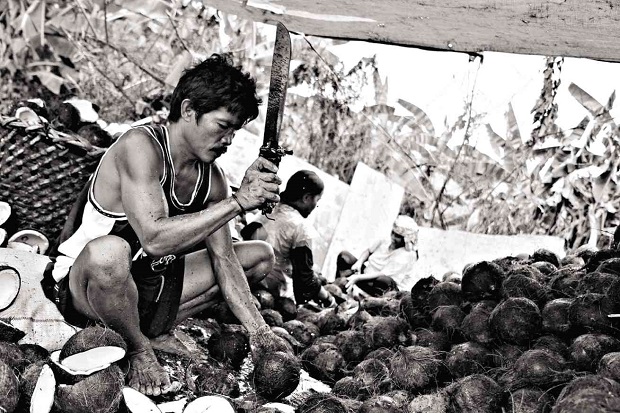Coco pests used to justify farmers’ eviction

LIFE is a vicious cycle for the coconut farmers of Quezon province. DELFIN T. MALLARI JR/INQUIRER SOUTHERN LUZON
LUCENA CITY—Landowners are taking advantage of the coconut scale insect (CSI) infestation now plaguing coconut farms nationwide, using it as an excuse to evict their tenants.
A coconut farmer from Candelaria town said some landlords did not want their farms to be rid of the pest.
“In fact, they want their whole plantation to die so that their tenants will be forced to leave,” said the farmer, who requested anonymity for fear of retaliation from his landlord.
The farmer said owners of coconut plantations in the towns of Sariaya, Candelaria and Tiaong were allowing CSI to devour their trees.
Roberto Gajo, provincial agriculturist, said his office had been receiving the same reports.
Article continues after this advertisement“This is the concern of local government units (LGUs),” Gajo said. He said LGUs should pass ordinances to protect farmers.
Article continues after this advertisementAccording to figures gathered by the provincial agriculturist’s office, at least 115,000 trees in 17 towns in Quezon province have been infested with CSI.
Claro Talaga, former Quezon board member and known coconut protection advocate, has joined the battle against CSI.
He transformed his former mushroom culture production area in Lucban town into a wood/bamboo/coconut husk vinegar processing facility. The concoction, which Talaga distributes for free to farmers, has been proven effective against CSI.
“Now is the time for President Aquino to release the coconut levy fund, or at least a portion of it, to help coconut farmers and victims of CSI and other calamities,” Talaga said.
Lito Mallari (not related to this correspondent), proprietor of Mallari Distillery in Tayabas City and one of the biggest producers of the coconut-based liquor “lambanog” in the province, said he had also been spraying his coconut farms with his own antipest mixture.
“The battle against the pest should not be left alone to the government,” Mallari said in a phone interview.
The provincial government has established a “biological control rearing station” in Pagbilao town.
The facility, the first in the Calabarzon (Cavite, Laguna, Batangas, Rizal and Quezon) region, provides biological organisms, like “coccinelid beetle,” in affected areas to combat CSI the natural way.
Quezon is one of the biggest coconut producing provinces in the country.